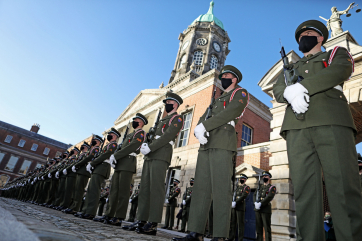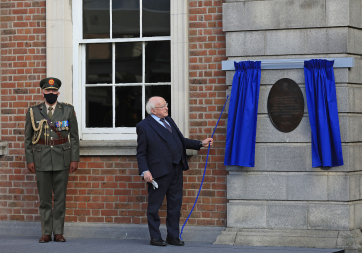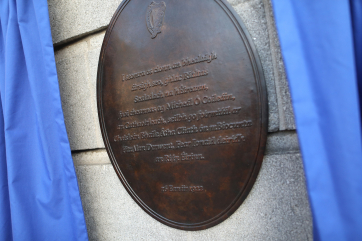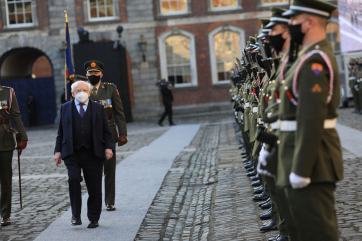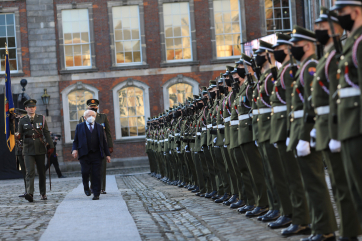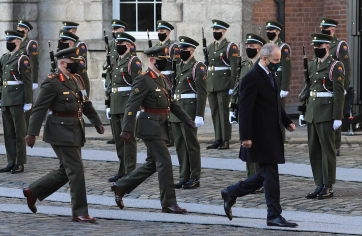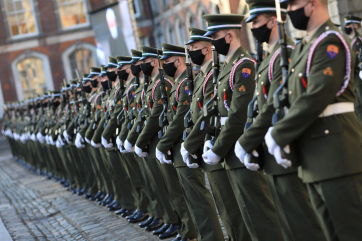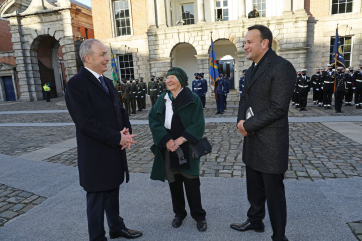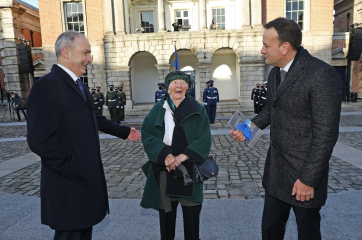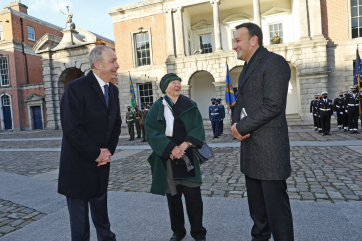Speech by President Michael D. Higgins at a reception for Descendants of the Irish Men and Women who Represented Dáil Éireann at the Treaty Negotiations in London in 1921
Áras an Uachtaraín Sunday, 16th January, 2022
A chairde,
Tá lúcháir orm an fáiltiú seo a óstáil inniu do roinnt shliochtaigh na bhfrean agus na mban Éireannach ar rinne ionadaíocht ar Dháil Éireann ag an gConradh Angla-Éireannach nó a d’fhreastal na hidirbheartaíochtaí i Londain i Mí na Nollag 1921 (míle naoi déag fiche is a haon).
I am delighted to host today this reception for some of the descendants of the Irish men and women who represented Dáil Éireann at the Anglo-Irish Treaty or who worked or served the negotiations in London in December 1921.
May I take the opportunity of thanking Dr Ronan Fawsitt and those who have been in touch with us in the Áras, and may I say what a valuable account Fiona Murray and Eda Sagarra have provided in their book, The Men and Women of the Anglo-Irish Treaty Negotiations 1921.
The agreement that was signed in London on 6th December 1921, by representatives of the British government and five representatives of the Irish Republic, was an agreement that had the profoundest of consequences for Ireland and its people, at the time, and for generations to come. Let us recall those five figures who together constituted the Irish plenipotentiaries.
Arthur Griffith was delegation chairman, TD for Cavan, Fermanagh and Tyrone, and MP for East Cavan and North-West Tyrone. Michael Collins was TD for Armagh and Cork Mid, North, South, East and West, and MP for South Cork. Robert Childers Barton was TD for Kildare-Wicklow and MP for West Wicklow. Eamonn Duggan was TD for Louth-Meath and MP for South Meath. Finally, George Gavan Duffy was TD for Dublin County and MP for South County Dublin.
Remembering the Forgotten
While these figures are well-known names, many of those in the wider delegation, including five women appointed by the Dáil, have been all but forgotten in the period’s historiography. The entire Irish party including those supporting the delegation in fact numbered some 70 people. As well as the five plenipotentiaries, there were four secretaries, 28 advisers, secretarial assistants, 13 security, seven dispatchers, two chaperones, and 12 key members of the household staffs working between 22 Hans Place, the headquarters of the Irish delegation, and 15 Cadogan Gardens, which housed Collins, his advisors, and his personal security team.
Throughout late September and early October, advisors and experts were appointed to the delegation. The economic advisers were Diarmaid Fawsitt, Charles Oldham, and Lionel Smith-Gordon. The financial advisers were Henry Connell Mangan, John J. Murphy, Timothy Smiddy, and Joseph Brennan. Seán Milroy was an adviser on Ulster, and George Murnaghan was legal adviser.
Women
Katherine McKenna was private secretary to Griffith, giving her unique access to some of the most significant documents and correspondence in Irish history at that time, and to the people ultimately responsible for the negotiations. In addition to McKenna, other women delegates included Elizabeth (Lily) O’Brennan, Gerty Conry, and the Lyons sisters, Ellie and Alice. These women were important members of the secretariat and formed its administrative wing.
The Lyons sisters were stenographers and clerical assistants on Collins’s staff in the finance office. They had both worked beside him throughout the War of Independence. Conry had commenced working for O’Hegarty in the secretariat of the Dáil in the Summer of 1921. O’Brennan was private secretary to Childers and had been part of the first delegation led by De Valera to London in July.
What all of these women and men had in common was a belief in public service. They put themselves on the line, as did their families, risking everything for a greater good, for the benefit of many.
Recalling the Treaty Negotiations
What a monumental moment in our nation’s history the Treaty negotiations constitute. There can be little doubt that those who represented Dáil Éireann at the negotiations all had the most honourable intentions, were concerned to interpret what could not be anticipated in terms of a definitive mandate, and did their very best in an extremely challenging context.
The situation could not have been more tense, the public more anxious. A fragile truce following the War of Independence that had cost the lives of as many as 2,300, all of which followed the misnamed Spanish Flu pandemic. There was so much that had left a public drained but undefeated struggling with relentless attacks, reprisals and burnings, weary from illness, fighting and death.
While for Nationalists of different hues, the ideal settlement would have been the creation of a sovereign, united Irish Republic, Arthur Griffith of the delegation, and, earlier perhaps at his meetings with Lloyd George in London in July, Eamon de Valera now at home in Dublin, appreciated that the British representatives would not accept such terms. Griffith’s objective was to maximise such degree of Irish independence as might gain a united Ireland, even if it be in the future. It would soon became clear to all of the Irish representatives involved that a unitary 32-county Irish Republic would not be conceded by the British.
Perhaps there was an under-estimation from the Irish side of the symbolism associated with the Crown and Empire, for reasons more of exemplary threat than pompous hubris. Throughout the negotiations, Lloyd George was insistent that Ireland must remain within the British Empire and accept the Crown as Head of State.
Collins and Griffith, in hammering out the final details, achieved British concessions on the wording of the oath and the defence and trade clauses, together with the addition of a boundary commission that could consider implementation of the Treaty and a clause upholding possible Irish unity.
Collins and Griffith in turn convinced the other plenipotentiaries to sign the Treaty, with the final decisions to sign made as a result of private discussions at 22 Hans Place late on 5th December 1921. The Treaty was signed soon after 2:00 am on 6th December, in the Cabinet Room at 10 Downing Street.
In what has become a well-quoted remark, Collins later claimed that, at the last minute, Lloyd George threatened the Irish delegates with a renewal of “terrible and immediate war” if the Treaty was not signed at once . Robert Barton later noted that:
“At one time he [Lloyd George] particularly addressed himself to me and said very solemnly that those who were not for peace must take full responsibility for the war that would immediately follow refusal by any Delegate to sign the Articles of Agreement”.
Lloyd George’s refusal to relinquish the menace of war is a defining aspect of the Treaty negotiations. Indeed the threat of conflict, of renewed and increased violence with the force of a released imperial strength – and drawing too on what was perhaps self-serving advice from Dublin Castle, that intelligence continued to suggest that a military victory was still possible – this threat would hover over every turn in talks, from the truce to the commencement of Treaty talks, indeed right up to their denouement on 6th December 1921.
Yet, there was movement, moving much further towards autonomy than the 1920 legislation, the Free State under the Treaty was now to be given complete independence in its domestic affairs: powers to levy all taxes, regulate foreign trade, raise an army, and considerable freedom on foreign policy.
From a nationalist perspective, the main defect of the text was that Ireland would not become a republic; it remained within the Empire, with the Crown remaining as Head of State. In addition, Britain retained its naval bases, thus compromising Irish neutrality in a future war. Partition, too, remained, though it was anticipated that the findings of the future Boundary Commission would lead to unity.
The Treaty itself is a short document. As Dr Thomas Mohr has remarked, the brevity of the Treaty is understandable. The text allowed for the creative use of ambiguity on key points of international law. The provisions were sufficiently flexible to allow people from both sides to see what they wanted in them. Insistence on greater clarity was judged to have been incompatible with mutual agreement. As Thomas Mohr puts it:
“Only a short and ambiguous document could create a viable settlement in 1921, which is why the Treaty took the form it did” .
Treaty Debates
The Treaty debates that ensued were difficult, and at times bitter and bruising, but also impressive, comprising, as they did, a robust stock-taking of the position by the contending parties, through which their differing views of, and recognition of the efforts of the past, parliamentary and otherwise, were outlined, and their hopes for the future were invoked and made public.
The divisions in the Dáil were perhaps more representative of divisions among nationalist sentiment and activism than they were of the divisions in wider society.
Arthur Griffith’s aspirational words from 19th December 1921 are worth recalling:
“I have signed a Treaty of peace between Ireland and Great Britain. I believe that Treaty will lay foundations of peace and friendship between the two Nations. What I have signed I shall stand by in the belief that the end of the conflict of centuries is at hand”.
Gavan Duffy told the Dáil on 21st December 1921,
“I am going to recommend this Treaty to you very reluctantly, but very sincerely, because I see no alternative”.
Robert Barton said that he had broken his oath of allegiance to the Republic when he signed the agreement, but did so,
“because I judged that violation to be the lesser of alternative outrages forced upon me, and between which I was compelled to choose”.
The greater outrage, one to be averted, that stood behind such sentiments was a tragic return to war with Britain, and possible military defeat and devastation. As Colum Kenny notes, having originally supported De Valera’s decision not to lead the team in London, Barton had lately pleaded with him to come to Downing Street – but his plea fell on deaf ears .
De Valera, on 19th December, made it clear that he opposed the Treaty because it “would not end the centuries of conflict between the two nations of Great Britain and Ireland” and that it would not “reconcile our own people, much less reconcile Britain and Ireland”.
The emphasis in the debates was placed on the possibilities and limitations of the constitutional options available, but scant mention was made of the forms that the economy might take, or the divisions within it, of society or its institutions in terms of how life would now be impacted, for example in health, housing, education, emigration, for either the majorities or the political minorities of the population North and South. The fate of southern unionists, too, was part of what was overlooked. Church-State relations and what might be anticipated as actions on the part of the likely hegemonies North or South did not figure in the speeches.
Republican socialist Peadar O’Donnell opposed the Treaty on such structural grounds as the unfinished and unequal nature of land distribution. Though Sinn Féin had also campaigned to preserve the Irish language, bizarrely this issue received scant discussion. Partition, however, was a major issue, with Ulstermen like Seán MacEntee speaking strongly against this clause.
All of the Deputies in their consultation with their constituencies during the Christmas break of 1921 were given a strong message in favour of the Treaty. While the Dáil voted to approve the Treaty, the objectors, including MacEntee, refused to accept it. This, combined with divisions on the role of militants and the armed forces resulted eventually in a bloody civil war of over 10 months’ duration, but we must never forget that behind these divisions stood the shadow of a looming, non-departed and very proximate Empire.
The position of Cumann na mBan deserves further study. Notably, all of the six female TDs – perhaps aware of, or anticipating the fact that what they would now be conceded would be a less than equal role than they had played in the Struggle itself and its infrastructure – were strongly in favour of continuing the war until, as those speaking in the debates put it, a 32-county Republic was established.
Was this a view derived from an island-wide consultation? Was the view offered drawn from the most painful of personal and family experience?
The Treaty itself, for some few parliamentary observers in London who had been interested in the general international independence movements, was described as having been procured by coercion and duress. As Gretchen Frieman has observed,
“The threat of renewed violence and confusion over the Irish delegates’ precise mission cast a shadow over the negotiations before they had even begun” .
Yes, members of Dáil Éireann might be split, but the nation gave its blessing to a settlement that was seen, both at home and abroad, as the best hope for what might be a long road to peace.
Aftermath
The ensuing Civil War tragically claimed more lives than the War of Independence that preceded it, and left Irish society divided and embittered for decades.
Yet, as terrible as events transpired in Ireland, the spectre of what might have been if an agreement in 1921 had not been reached has examples for consideration in other independence movements seeking exit from empire.
In assessing the Treaty, Conor Mulvagh suggests that it is useful to ask questions beyond what Ireland failed to gain, as is the dominant narrative, and to give space to ask what Britain failed to hold .
The Treaty was a climb-down for the British Empire, and represented an attempt to extract itself with honour from what so many of its parliamentarians called the ‘Irish morass’. The British government had, through the Treaty, sought to define the very essence of Anglo-Irish relations and feared that, in its own exemplary way, Ireland’s independence, if conceded, would serve as an example and an inspiration, as indeed it did, throughout the emancipatory decolonisations of the 20th century.
Ethical Remembering
As we continue to remember, recall this period in our nation’s history, and seek to do so ethically, and with such moral purpose as will leave us prepared for the future, it is important that we conduct our remembrance in a manner that allows for such a reflection to be inclusive, open to all evidence. Narrative hospitality must always be our goal in commemoration, but this, as philosopher Paul Ricoeur tells us, requires generous effort .
It requires, too, reaching an accommodation with conflicting versions of the past which is merely a stage in the journey, via understanding, to what might be the destination that is forgiveness for past hurt, neglect or omission; a destination which, in so many areas of conflict, at home and abroad, past and present, many find difficult, some we must acknowledge may remain too filled with hurt to undertake such a journey.
It is only through such an inclusive, never evasive, ethical remembering, as we now have an opportunity to attempt to undertake as we recall these painful but also emancipatory moments in our nation’s birth. It is important that we seek to avoid any re-invocation of the blinding categories of censure or denunciation, or indeed revenge and bitterness that might be abused as fuel for present divisions.
Narrative hospitality requires the generous openness to hearing each other’s narrative. Narrative flexibility requires the generous readiness to recognise that there are multiple narratives from 1912-1922, that there is no attempt at imposing any single, superior, normative narrative. Understanding is what we are about, helped as we are, and will be, by new finds and documents that allow for narratives to change.
Narrative plurality recognises the complexity of history, the illusions and limitations of knowledge, and that our narratives are diverse, provisional and plural, and always must be open to new facts as they are discovered.
The option of avoidance by enforced silence will serve nobody. An enforced or affected amnesia as to actions that led to lost, damaged or changed lives through the generations will serve no purpose. We have to live with our complete truth of past and present.
There are always, have been always, those who saw the beauty of peace and forgiveness.
May I say that Sabina and I are so glad that you will have the opportunity later to view the 16 birch trees planted here in the grounds of the Áras in 2019, to commemorate those who were executed after the 1916 Rising. I am especially glad that Judge Barton and Mrs. Ann-Marie Barton are with us, mindful of the fact that it was a proposal from Robert Barton who, in delivering the message from the first meeting of Dáil Eireann in January, 1919 conveyed this wish for the planting of trees. Those birch trees, planted in our time by Sabina and I, are a symbol of rebirth and new beginnings which of course have a special resonance for us all at this time.
As we continue to mark these pivotal moments as part of our nation’s centennial commemorations, let us together embrace and welcome such narrative complexity, cultivate memory as an instrument we will make available in its honesty and fullness for all of the possibilities for the living so that we may realise a shared but diverse memory, at peace, unburdened by distortions, and ready for an ethical remembering with a capacity to replace our past entrenchments, as well as offering an openness to others, as a strong foundation of a shared, agreed, enhanced and fulfilling future.
Beir beannacht.

